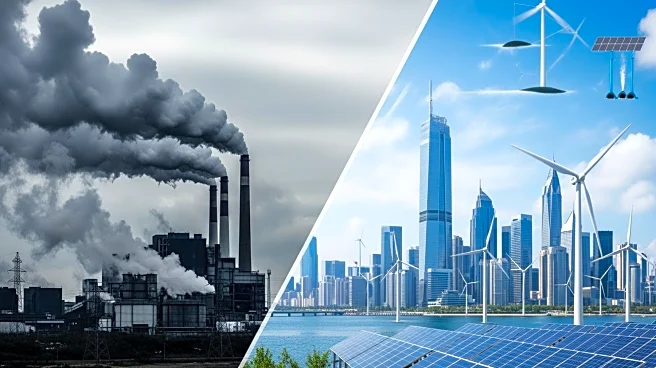What's Happening?
Recent letters to the editor highlight concerns over the United States' continued reliance on fossil fuels, which some argue benefits China in the global clean energy race. Critics point out that fossil fuel interests
have significantly supported President Trump's reelection campaign, resulting in policies that favor oil and gas industries. These policies include tax incentives, expedited drilling projects, and the removal of environmental restrictions. Meanwhile, China has strategically positioned itself as a leader in solar, wind, and electric vehicle technologies, exporting these advancements worldwide. This situation has led to calls for the U.S. to shift focus towards renewable energy sources, such as solar and wind, which are increasingly cost-effective due to advancements in battery storage.
Why It's Important?
The U.S.'s current energy policies have significant implications for both domestic and international landscapes. Domestically, the emphasis on fossil fuels could hinder the transition to cleaner energy sources, potentially impacting public health and environmental sustainability. Internationally, as China continues to dominate the clean energy sector, the U.S. risks falling behind in technological advancements and economic opportunities associated with renewable energy. This dynamic could shift global power balances, with countries increasingly opting for cleaner energy solutions offered by China. The situation underscores the need for the U.S. to reconsider its energy strategy to remain competitive and address climate change effectively.
What's Next?
The future of U.S. energy policy may hinge on upcoming political and judicial decisions. If the Supreme Court supports efforts to repeal environmental protections, it could further entrench fossil fuel reliance. However, growing public and scientific advocacy for renewable energy might influence policymakers to adopt more sustainable practices. Additionally, technological innovations in carbon dioxide removal and natural carbon storage methods could play a crucial role in shaping future energy strategies. Stakeholders, including environmental groups and clean energy advocates, are likely to continue pushing for policy changes that prioritize sustainability and reduce carbon emissions.
Beyond the Headlines
The debate over energy policy also touches on broader ethical and cultural dimensions. The reliance on fossil fuels raises questions about environmental justice, as marginalized communities often bear the brunt of pollution and climate impacts. Furthermore, the cultural shift towards renewable energy could redefine societal values around consumption and conservation. Long-term, the transition to clean energy might foster new economic models and job opportunities, reshaping industries and workforce dynamics. These deeper implications highlight the complex interplay between energy policy, societal values, and global leadership.









